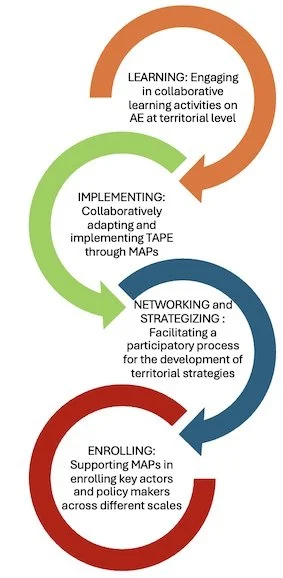TAPELINE
Transitioning to Agroecology through participatory Learning, Implementation of TAPE Tool, strategizing and Networking, and Enrolling
Duration: 05/2025 - 04/2028 (tbc)
Summary
TAPELINE: Transitioning to Agroecology through participatory Learning, Implementation of TAPE Tool, strategizing and Networking, and Enrolling.
Despite recent advancements in agroecological (AE) research, implementation of AE elements at territorial level remains limited. TAPELINE addresses this gap by pioneering a multi-actor participatory approach to evaluate current AE performances and strategize future actions for the large-scale deployment of AE at both farm and landscape levels. The project's main objective is to catalyze a large-scale transition towards agrifood systems rooted in AE principles. This will be achieved through the adaptation and implementation of the Tool for AE Performance Evaluation (TAPE) in five territories in selected European countries (Belgium, Switzerland, Cyprus, Germany, Italy), integrating context-specific metrics and a transdisciplinary participatory approach.
TAPELINE's guiding principles emphasize collaboration, co-learning, and co-creation, fostering iterative exchanges among diverse stakeholders, including academics, FAO experts, local stakeholders, and highly skilled facilitators. Through co-learning events, participatory analysis, and strategic roadmap development, the project aims at empowering stakeholders in crafting sustainable agricultural strategies rooted in AE elements at the local level, thereby fostering a transition to AE at landscape level. By leveraging expertise and resources across Europe, TAPELINE pilots innovative techniques and approaches, fostering sustainable agriculture in line with the Standing Committee on Agricultural Research on Agroecology (SCAR-AE) and contributing to the EU's Green Deal objectives.
Source: Dominique Barjolle Musard
TAPELINE delivers key exploitable results, including an updated TAPE tool, local strategies for agroecological transition, L-I-N-E (Learning- Implementing-Networking and strategizing-Enrolling) guidelines for replication in other territories, dashboard to monitor the impact of the implementation of interventions, online training, and Multi-Actors Platforms (MAPs). The project engages potential users early in the cocreation process to ensure successful uptake of its results.
Overall, TAPELINE will increase knowledge, build capacities, and raise the implementation of AE practices, fostering their social, economic, and environmental potential. TAPELINE's target audience includes civil society representatives, farmers, researchers, policymakers, and regulators at national and EU levels. The project engages with diverse actors to ensure the relevance and uptake of its outcomes. This will contribute to tackle major challenges like climate change, low farm-gate prices and unattractiveness of farming to the youth. TAPELINE promotes the AE transition that corresponds to the local aspirations of stakeholders, by encouraging ad hoc nature-based innovations that mitigate the impact of climate change and reduce emissions, and by promoting innovative farming methods and para-agricultural activities that improve farmers' incomes.
As main exploitation and dissemination measures, the project will develop materials and training, and knowledge exchange activities. Through stakeholder engagement, workshops, mentoring programs, and scientific collaborations, the project aims to maximize the diffusion and uptake of its results. A range of communication tools and channels, including MAPs, a project website, social media networks, podcasts, brochures, and popular media.
Coordinator
Dominique Barjolle Musard
The Faculty of Business and Economics of the University of Lausanne (HEC Lausanne), SWITZERLAND
Email: dominique.barjolle@unil.ch
Source: Dominique Barjolle Musard
Partners
Dimitris Goussios - Research and Development Institute for the Mountain Regions of the Mediterranean Islands (MountMed Institute), CYPRUS
Philippe Baret - Catholic University of Louvain (UCL), BELGIUM
Maria Nicolina Ripa - University of Tuscia (UNITUS), ITALY
Christine Fürst - Martin-Luther University Halle-Wittenberg (MLU), GERMANY
Matteo Ansanelli - Associazione Agricoltura è Vita, ITALY
Angelos Parmatzias - Citizens in Power (CIP), CYPRUS
Clotilde de Montpellier - Farm for good, BELGIUM
Source photos banner:
Landscape: Photo by Greta Farnedi on Unsplash
Tractor: Photo by Ethereal Optics on Unsplash





